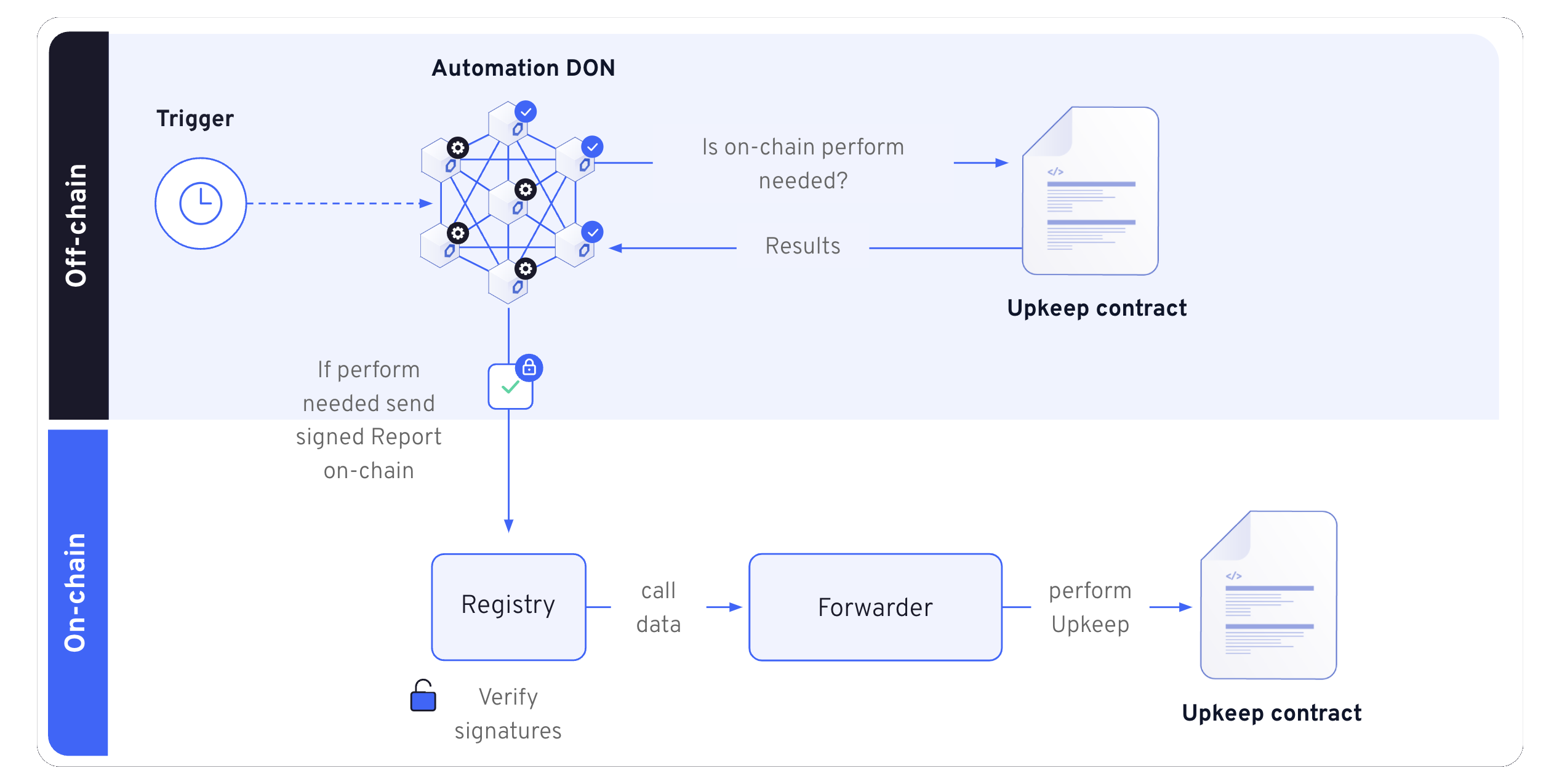# Introduction to Automation Chainlink Automation is a decentralized service that automatically executes smart contract functions based on predefined conditions or at specific intervals. ## Why do we need Automation? Smart contracts are powerful but have a fundamental limitation: they cannot trigger their own functions. They need external stimuli to execute their code, which is where Chainlink Automation comes in. Think of your smart contract as a sophisticated machine. It can perform various tasks but needs someone to press its buttons to activate these functions. Manually monitoring conditions and triggering functions is an inefficient and unreliable way to ensure the machine is doing things in a timely manner. Chainlink Automation solves this by acting as a vigilant operator for your smart contracts. It constantly monitors for specific conditions or timeframes you've defined. When these triggers are met, Chainlink Automation automatically executes the designated functions in your contract. It operates 24/7, with reliability and precision that manual monitoring cannot achieve. ## The Concept of an “Upkeep” In Chainlink Automation, an "upkeep" refers to a registered job that the network will monitor and execute on-chain when appropriate. When you register an upkeep, you're essentially telling the Automation network: "Watch for these specific conditions, and when they occur, call this function in my contract." These specific conditions are called "triggers". ## Types of Automation triggers Chainlink Automation supports three distinct trigger mechanisms: - **Time-based triggers**: These execute functions in your smart contract according to a schedule defined by a cron expression. For example, you could set a function to run every day at midnight or once per week. - **Custom logic triggers**: These use custom logic defined within your smart contract through the `AutomationCompatibleInterface`. Your contract implements a `checkUpkeep` function that returns whether conditions are right for execution. - **Log trigger**: These monitor blockchain events (logs) emitted by smart contracts. Chainlink Automation executes the associated function when a specified event occurs, allowing for event-driven automation. ## Automation Architecture The Chainlink Automation Network consists of specialized Automation nodes coordinated by the Automation Registry smart contract. This Registry manages upkeep registrations and compensates nodes for successful executions. Developers can register upkeeps, while node operators can register as Automation nodes. The network operates using a peer-to-peer system based on Chainlink’s [OCR3 protocol](https://docs.chain.link/architecture-overview/off-chain-reporting). - Automation nodes continuously scan for upkeeps that are eligible for execution. - Nodes reach consensus on which upkeeps to perform. - They generate cryptographically signed reports. - The Registry validates these reports before executing the upkeep functions.  This architecture provides several key benefits: - Cryptographic guarantees of execution. - Built-in redundancy across multiple nodes. - Resistance to network congestion with sophisticated gas management. - Reliable performance even during gas price spikes or blockchain reorganizations. The system includes internal monitoring and alerting mechanisms to maintain network health and ensure high reliability and performance. Chainlink Automation supports multiple blockchains, with details on the [supported networks page](https://docs.chain.link/chainlink-automation/overview/supported-networks). Information about the cost of using Chainlink Automation can be found on the [Automation economics page](https://docs.chain.link/chainlink-automation/overview/automation-economics).
Introduction to Automation
Chainlink Automation is a decentralized service that automatically executes smart contract functions based on predefined conditions or at specific intervals.
Why do we need Automation?
Smart contracts are powerful but have a fundamental limitation: they cannot trigger their own functions. They need external stimuli to execute their code, which is where Chainlink Automation comes in.
Think of your smart contract as a sophisticated machine. It can perform various tasks but needs someone to press its buttons to activate these functions. Manually monitoring conditions and triggering functions is an inefficient and unreliable way to ensure the machine is doing things in a timely manner.
Chainlink Automation solves this by acting as a vigilant operator for your smart contracts. It constantly monitors for specific conditions or timeframes you've defined. When these triggers are met, Chainlink Automation automatically executes the designated functions in your contract. It operates 24/7, with reliability and precision that manual monitoring cannot achieve.
The Concept of an “Upkeep”
In Chainlink Automation, an "upkeep" refers to a registered job that the network will monitor and execute on-chain when appropriate.
When you register an upkeep, you're essentially telling the Automation network: "Watch for these specific conditions, and when they occur, call this function in my contract."
These specific conditions are called "triggers".
Types of Automation triggers
Chainlink Automation supports three distinct trigger mechanisms:
-
Time-based triggers:
These execute functions in your smart contract according to a schedule defined by a cron expression. For example, you could set a function to run every day at midnight or once per week. -
Custom logic triggers:
These use custom logic defined within your smart contract through theAutomationCompatibleInterface. Your contract implements acheckUpkeepfunction that returns whether conditions are right for execution. -
Log trigger:
These monitor blockchain events (logs) emitted by smart contracts. Chainlink Automation executes the associated function when a specified event occurs, allowing for event-driven automation.
Automation Architecture
The Chainlink Automation Network consists of specialized Automation nodes coordinated by the Automation Registry smart contract. This Registry manages upkeep registrations and compensates nodes for successful executions.
Developers can register upkeeps, while node operators can register as Automation nodes. The network operates using a peer-to-peer system based on Chainlink’s OCR3 protocol.
Automation nodes continuously scan for upkeeps that are eligible for execution.
Nodes reach consensus on which upkeeps to perform.
They generate cryptographically signed reports.
The Registry validates these reports before executing the upkeep functions.

This architecture provides several key benefits:
Cryptographic guarantees of execution.
Built-in redundancy across multiple nodes.
Resistance to network congestion with sophisticated gas management.
Reliable performance even during gas price spikes or blockchain reorganizations.
The system includes internal monitoring and alerting mechanisms to maintain network health and ensure high reliability and performance.
Chainlink Automation supports multiple blockchains, with details on the supported networks page. Information about the cost of using Chainlink Automation can be found on the Automation economics page.
Introduction To Automation
A foundational overview to Introduction to Automation - Understand the necessity of Chainlink Automation for smart contracts and how it enables automated function execution. Discover the concept of upkeeps, various trigger mechanisms, and the reliable decentralized architecture behind it.
Previous lesson
Previous
Next lesson
Next
Course Overview
About the course
What you'll learn
Smart contract and Solidity fundamentals
Chainlink’s decentralized oracle network (DON)
Chainlink Data Feeds
Chainlink Data Streams
Chainlink Automation
Chainlink CCIP
Chainlink Functions
Verifiable Random Function (VRF)
Chainlink Proof of Reserve
Course Description
Who is this course for?
- Smart Contract Developers
- Solutions Architects
- Blockchain Engineers
- Web3 Developers
- Security Researchers
Potential Careers
Smart Contract Engineer
$100,000 - $150,000 (avg. salary)
DeFi Developer
$75,000 - $200,000 (avg. salary)
Web3 developer
$60,000 - $150,000 (avg. salary)
Web3 Developer Relations
$85,000 - $125,000 (avg. salary)
Smart Contract Auditor
$100,000 - $200,000 (avg. salary)
Security researcher
$49,999 - $120,000 (avg. salary)
Blockchain Financial Analyst
$100,000 - $150,000 (avg. salary)
Last updated on July 25, 2025
Duration: 9min
Duration: 1h 17min
Duration: 42min
Duration: 30min
Duration: 1h 03min
Duration: 49min
Duration: 30min
Duration: 19min
Duration: 37min
Duration: 30min
Certification: Chainlink Fundamentals
The Chainlink Fundamentals proficiency exam covers is designed to confirm your grasp of all key concepts and learnings presented in the course material. Exam takers will have 75 minutes to complete 50 questions and must score 30/50 to pass and earn a Certificate of Completion. Because course material is continually updated, The Chainlink Fundamentals Certificate of Completions expires after 1 year. To remain current, holders must re-take the exam and pass to confirm their current knowledge.
Course Overview
About the course
What you'll learn
Smart contract and Solidity fundamentals
Chainlink’s decentralized oracle network (DON)
Chainlink Data Feeds
Chainlink Data Streams
Chainlink Automation
Chainlink CCIP
Chainlink Functions
Verifiable Random Function (VRF)
Chainlink Proof of Reserve
Course Description
Who is this course for?
- Smart Contract Developers
- Solutions Architects
- Blockchain Engineers
- Web3 Developers
- Security Researchers
Potential Careers
Smart Contract Engineer
$100,000 - $150,000 (avg. salary)
DeFi Developer
$75,000 - $200,000 (avg. salary)
Web3 developer
$60,000 - $150,000 (avg. salary)
Web3 Developer Relations
$85,000 - $125,000 (avg. salary)
Smart Contract Auditor
$100,000 - $200,000 (avg. salary)
Security researcher
$49,999 - $120,000 (avg. salary)
Blockchain Financial Analyst
$100,000 - $150,000 (avg. salary)
Last updated on July 25, 2025

